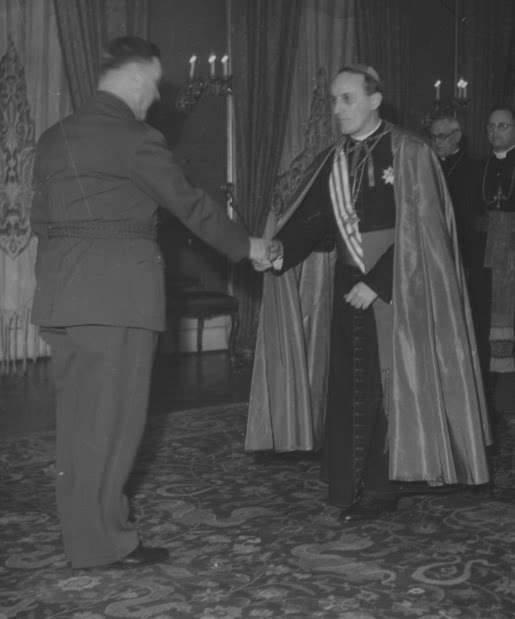ACCORDING TO PARTISANS of the movement today, the Croatian Ustase (alternately, to an English audience, Ustasha, Ustashe or Ustashi from ustanak for "uprising") trace their ideological lineage back to the Croatian Party of Right, a 19th century political construct in the Austro-Hungarian Empire. The Party of Right was formed by Ante Starcevic, an early devotee of what later became known as the Yugoslavist movement, which favoured the union of the Southern Slavs into a common state to stave off German, Turkish, and Italian imperialism in the Balkans.
Founded after his defection to extreme, chauvinistic nationalism, Starcevic's Party of Right defined itself chiefly by what it opposed: the dominance of the Austrian bureaucracy as well as the Hungarian gentry of the Hapsburg state; the Yugoslavist idea promoted in the Croatian lands by Bishop Josip Strossmayer; and, most of all, the Serbian nation, including the thousands of Serbs who had settled at the Emperor's invitation along the Empire's southwestern flank, forming a military bulwark against Turkish expansion. Starcevic postulated that the Croats, unlike the "slave-Serbs," were a lost tribe of Goths who had somehow fallen into a Slavic language, customs and identity.
The Party of Right was doomed to remain on the fringe of Croatian national politics within the Empire. But it was an attractive ideology when it was discovered by a young lawyer from Bradina, a small village in present-day Bosnia-Hercegovina, named Ante Pavelic.
Ante Pavelic rose through the ranks of the Party of Right after the incorporation of Croatia into the Kingdom of Serbs, Croats and Slovenes, later to be renamed Yugoslavia. He led the far right-wing of what was already a right-wing party - the "Frankist" faction, so named after Josip Frank, a singularly intolerant man despite his ethnic background as an assimilated Jew.
Party of Right membership in the 1920s was dwarfed by that of a more moderate Croat-based opposition, called the Croatian Peasant Party. Led by the brothers Stjepan and Ante Radic, the Peasant Party rejected the formation of Yugoslavia as illegitimate. Stjepan Radic was an intellectual with a soft touch for the peasantry of his party's name, and a wily, charismatic politician. Avowedly anti-clerical, in the summer of 1924 Radic visited the USSR and affiliated the Peasant Party with the Communist Peasant International, or Krestintern. After a long parliamentary boycott and several spells as a political prisoner, Radic did leave for Belgrade to form a united opposition with Serbian deputies opposed to the ruling elite. On June 20, 1928, a Montenegrin deputy drew a revolver and shot Radic and two other deputies on the floor of parliament itself; he died of his wounds on the eighth of August.
On January 6, 1929, King Alexander Karadjordjevic declared his personal dictatorship. Among those who sought refuge abroad was Ante Pavelic. After drifting rather aimlessly through Vienna, he established a relationship with Ivan "Vancia" Mihailov's faction of the Internal Macedonian Revolutionary Organization (IMRO), a terrorist organization founded more than thirty years before aimed at establishing Bulgarian hegemony in Macedonia. It is believed that Mihailov recommended Pavelic to Italian duce Benito Mussolini, who soon became patron, providing funds and training at a camp near Siena to what Pavelic christened his Ustase.
As Italian support was uncertain and often wavered (Count Galeazzo Ciano, Mussolini's son-in-law and Italy's Foreign Minister after 1937, did not meet with Pavelic until more than two years after assuming office), the Ustase sometimes supported the movement through racketeering, extortion, black marketeering, and other criminal activities. The primary victims in these activities were their fellow Croat emigres, a trend which would occur again during their second exile. (more...)
From the Ratline to the Firing Line

No comments:
Post a Comment